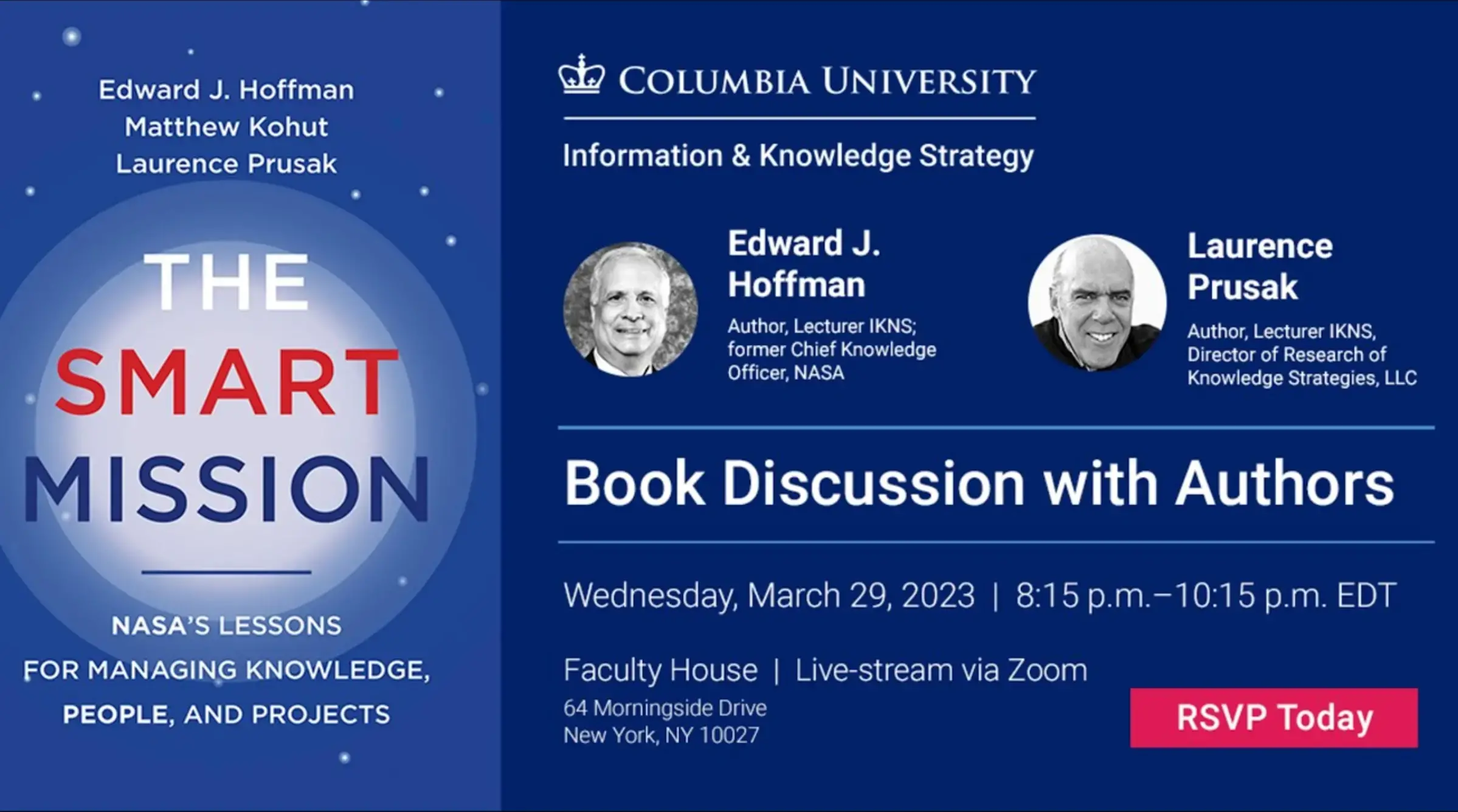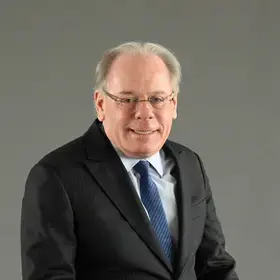School of Professional Studies (SPS) lecturer and former NASA Chief Knowledge Officer Dr. Edward Hoffman recently published a book with coauthors Matthew Kohut and former IKNS lecturer Laurence Prusak: The Smart Mission: NASA's Lessons for Managing Knowledge, People, and Projects. Dr. Hoffman teaches in the Master of Science in Information & Knowledge Strategy program. His courses: Foundations for Knowledge-Driven Organizations, Navigating the Future of Work, and Strategic Consulting for Knowledge-Based Organizations. Dr. Hoffman sat down with a student writer, Liam Etti, to share some lessons from his career—and his new book. Edited excerpts:
What inspired you to write this book?
I spent 33 years at NASA; I got to NASA because of Columbia. I was a student in the early ’80s, and I was going to go for my doctorate at Columbia University at Teachers College in the Social-Organizational Psychology program. I was doing research on the competencies of the most effective leaders and how they successfully lead teams to change.
I was brought in to do an internship at NASA in 1983, and I ended up spending 33 years there, retiring in 2016. I’ve had many people for many years saying, “Oh, you have got to write a book about your experiences at NASA and being a psychologist there!” And I loved my time at NASA. It’s a great organization! They say that you come to NASA for the mission, but you stay for the people, and that’s really true. The work is cool. It’s going to the Moon. It’s the James Webb Space Telescope. It’s climate research. It’s exploring Mars. It’s robotics. It’s all these different things.
But the people are wonderful, and I wanted to capture my experiences. Coming from Columbia, I was the first one at NASA really studying leadership development, and I was the first organization development practitioner there. So that, coupled with the fact that the book is really a story about a great place to work, is how I came up with the idea for The Smart Mission: NASA’s Lessons.
You were tasked with leading after a major disaster—the Challenger in 1986. The Columbia shuttle disaster occurred in 2003. How do you move an organization forward after such public failures?
It’s actually easier for an organization to move forward and change after a big failure than at any other time–assuming, of course, that you are working in an organization where you have leadership that is committed to success and that wants to keep the organization going. A failure gives the ultimate motivation for moving forward.
You have probably heard the idea “When you’re on a burning platform, you have to do something.” You don’t stay there. So the Columbia and the Challenger failure led the leadership to say, “We need to do better.” And they were willing to fund and resource efforts around learning and development.
I was asked to launch the Project Management Academy for NASA in 1991 because of the Challenger failure, and it opened up the importance of learning. It opened up the importance of having a competency framework for what effective project leadership looks like. It opened the door for looking at how we establish the values and the methods for running a NASA project. It opened up the importance of sharing knowledge and the use of stories in building high-performance teams.
What advice would you give to young leaders entering into a project management role?
There are many things, but the most important thing is active communications.
Projects, teams, organizations, and societies that have significant problems that could contribute to failure are quiet. They’re silent. And by that, I mean they don’t tell each other what’s going on. If I see someone sneaking up behind you, I will tell you, “Hey!” I’ll shout it. If I’m afraid to say anything, I won’t, and you will be in trouble. Similarly, organizations and teams that are silent get into trouble. So an important aspect of an effective team is to share, to communicate, to have conversations.
They should also be committed to continuous learning. Carol Dweck calls it “the growth mindset.” They are willing to learn. They acknowledge they don’t have all the answers. That’s a key component.
Another factor is having a strong team orientation. This means you have the capabilities, but you also have the interpersonal skills to respect each other, to listen to each other, and to include each other. You have a team that’s diverse with different perspectives. There should be a culture of psychological safety, a culture where people can say anything to each other and also disagree with each other. That makes it easy for people to tell the truth, their truth.
What changes do you anticipate in information and knowledge strategy?
One is that I increasingly work on project teams, which means that you pull together different people with different areas of knowledge and expertise to work together to attain these missions of success—whether it’s going to the moon or developing the next medical technology or coming up with solutions for health care.
All of this work is nowadays done in project mode, where people are coming together from different areas with multidimensional capabilities, and they have to work together on a team and be aware of the costs and the time frame. The future will be heavily project-based, working together in these kinds of team structures. Another change is that the human element, the interpersonal skills, and the ability to collaborate will be more important than ever. As technology and AI start doing more of the mundane routine work, what’s going to be left for people? It’s going to be knowing how to relate with people in terms of “What are the ideas? What are the innovations? How do we communicate more effectively?”
In other words, the skills of collaboration, the skills of innovation, and the skills of empathy will be more important than ever before, because of the importance of working together across different cultures.
About the Program
The Columbia University M.S. in Information & Knowledge Strategy (IKNS) program provides students with foundations in information science, organizational psychology, and change management as well as practical skills in project management and executive leadership.
The fall 2023 application deadline for the M.S. in Information & Knowledge Strategy is June 15. Applications are reviewed and admission decisions released on a rolling basis. Learn more here.



